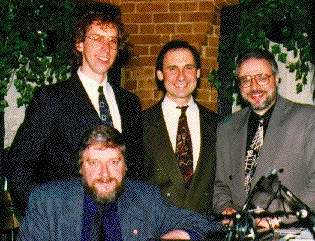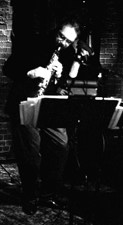
Vol. 1 no. 4

Jazz Men On The Go (JMOG)
Don Thompson (seated), (l-r): Neil Swainson, Joe Labarbera, Pat Labarbera
AW: When you play with JMOG, is it the same thing? Do you discuss the music?
PL: We do talk the tunes through, but we don't discuss the harmony. We bring the tunes in and play them. If we play them a lot, they evolve. Like there are rhythm section shots that Don, Neil and Joe play that have just evolved over time. Don plays stuff and Joe catches it. I don't think there's much discussion, although Don and I are always talking. Don comes at harmony a different way than I do. He comes to it by ear, and then understands it theoretically. Because of my training at Berklee, I see things visually. When I work with JMOG, I get more ideas, and I compose more.
AW: Is there anything you haven't done musically that you would like to?
PL: Someday I'd like to do an album of ballads, not because of Trane's record, but because every thing I seem to have on record is always so intense. There's one thing here that I like to listen to (pulls out a tape of a gorgeous ballad, Something to Live For with the Humber Faculty band).
AW: Do you find your sound has changed over the years? As I listen here it sounds very different.
PL: Yeah. It's probably because of the tenor; it's Lucky Thompson's old horn. I always felt that I never had a good Mark VI. When I picked this one up, it just had a body to it. The soprano too; it has a nice dark sound to it.
 AW: Do you play your soprano a lot?
AW: Do you play your soprano a lot?
PL: Yeah, but not as much as I should. I'm playing it differently now; I'm trying to think of the soprano more like Miles plays the trumpet. I've done so much of the Trane thing that now I'm trying to play more melody. You don't want to get that pinchy kind of sound, and yet some guys get a sound almost like an alto, too much like an alto. I still like it to be a soprano sound, but not too nasal. Trane had a real nice sound. Lucky's records beautifully; I just did a thing with Abercrombie on it.
AW: What about the whole jazz education thing?
PL: You know, I never thought I would end up teaching. I said "I'm never going to teach" when I was young. When I moved to Canada, I started to teach privately. To teach, I had to go back and trace how I had learned. In doing that, I found areas that I had missed or neglected, and so I found I was learning from the students. As I was teaching something, I would sometimes think, I should have done that instaed of this, taken a right turn instead of a left. Ralph Bowen studied with me for a while, Mike Murley, Alex Dean. Kirk McDonald and I would get together and exchange ideas.
I started getting more and more calls to do educational things. Jamey Aebersold was very helpful; he encouraged me to share my road knowledge by teaching at his jazz camps. I started finding more and more material to use, play-a-longs, and then worked on formulating a way to teach effectively. After a while I became real good at just hearing a student play, almost too good, which can spoil some of the listening enjoyment. I'll hear someone and think, "this guy's not playing any triplets," or "this guy's not breathing." It's really made me pay attention to my own playing. Sometimes when I'm playing, I'll catch myself doing things I've told students not to do. Eventually I was asked to teach courses at the University of Toronto, York University, and Humber College.
I like teaching now. I hope that these young people all find a place to play, and have their voice heard. I joined Humber College full-time about in '89, and now that we're at the Lakeshore Campus, I have excellent facilities to teach in.Being with one college means I only have one schedule to worry about; one system of marking and one set of exams. And I'm allowed some time at Humber for professional development, to teach or perform at other educational facilities. If I need to take time for a tour, they'll let me go. We have new facilities now, which is great. During the summer I teach a couple of jazz programs and try to tour as much as possible.
AW: How do you see yourself now as opposed to how you saw yourself when you were first on the scene?
PL: It's not that much different than when I first decided to be a jazz player. I think that I've kept my honesty about the music happening all the way through my jazz career. I try to play music that is not compromised. Basically, I still feel that I'm a jazz tenor player who likes to burn, and play tunes, and play with groups...learn new music and new techniques. I'm still looking for the perfect Link, and the perfect reed. I'm more skilled, more experienced, and I have a better sense of the music, harmonically...but I still hold that same image of myself a jazz tenor player trying to play up to the level I hear in my head. Although now I teach and do other things besides jazz like the Toronto Symphony, I still consider myself a jazz player, first and foremost.